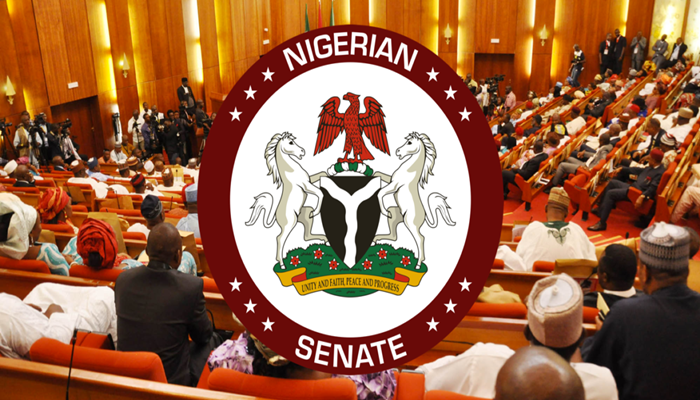
The Senate on Tuesday proposed a six-year single term for the Governor and Deputy Governors of the Central Bank of Nigeria (CBN).
The Red Chamber also sought to limit amount the Federal Government can borrow from the apex bank under the Ways and Means Advances.
For external Directors appointed on the board of the CBN, the Senate proposed that they should hold office for a non-renewable term of five years (one year less than the six-year tenure of the Governor and Deputies).
This followed the second reading a Bill which seeks to amend the Central Bank of Nigeria (CBN) Act
The Bill, among others, also seeks to make the CBN comply with the provisions of the Fiscal Responsibility Act.
The Chairman, Senate Committee on Banking, Insurance and other Financial Institutions, Senator Adetokunbo Abiru (APC – Lagos East), and 41 other lawmakers sponsored the Bill, titled: “A bill for an Act to amend the Central Bank of Nigeria, CBN, Act No 7, of 2007.”
On Ways and Means Advances, the Bill proposed that advances the apex bank can grant the Federal Government should not exceed 10 per cent of average government actual revenues during the preceding three years.
“For the purpose of determining the government’s actual government revenue, proceeds from asset sales shall be excluded to avoid capturing revenues from exceptional items.
“Also, such temporary loans should be repaid in full within three months from the date it is made available. In order to minimize default risk, any sum which becomes outstanding at the end of the expiration of the credit period should be held against and recovered from the proportion of the Federal Government’s FAAC Receipts,” he said.
Abiru, in his lead debate, noted that the current CBN Act of 2007, which charges the Bank with the overall control and administration of the monetary and financial sector policies of the federal government, “has not been amended for over 16 years despite growing changes to the Bank’s Balance sheet as well as challenges in monetary policy implementation occasioned by fiscal dominance and the rapidly changing financial landscape.”
The proposed amendments, according to him, are aimed at strengthening the bank “to discharge its primary mandate of maintaining monetary and price stability in support government’s economic growth objectives as well as align its governance mechanisms with global best practices.”
According to him, “Section 8 (2) of the CBN Act currently grants the Governor and Deputy Governor’s tenure of five years and they are eligible for re-appointment for another term not exceeding five years.
“The Bill proposes to amend this provision to provide a single non-renewal term of 6 years for the Governor and the Deputy Governors.
“This is the practice adopted by many independent Banks such as the US Federal Reserve and the European Central Bank where their Chief Executive Officers serve only one non-renewable term.
“Empirical evidence shows that a single term for the members of the Executive and Board members of central banks helps to reduce political influence on monetary policy decisions and the time inconsistency problem associated with non-independent central banks.
“In addition, the Bill proposes that where a vacancy is created by the death or resignation of a CBN Governor or Deputy Governor, the President can appoint an acting Governor in the interim pending the appointment of a substantive Governor or Deputy Governor.
“Where a substantive appointment is made, such appointment will be for a fresh term rather than serving the tenure of the previous Governor or Deputy Governor.
“It can be observed that there is no mention of gender as part of the factors to be considered by the President in the appointment of the five external Directors. In line with inclusivity in the governance of the Bank, the Bill proposes to insert the word ‘gender’ in this provision.”
He added: “Section 10 (3) of the current Act stipulates that each Director appointed shall hold office for four years (one year less than the tenure of the Governor and Deputies) and shall be eligible for re-appointment for another term of four years.
“It is therefore proposed that the five external Directors should hold office for a non-renewable term of five years (one year less than the six-year tenure of the Governor and Deputies).”
For proper alignment of monetary and fiscal policies, Abiru disclosed that the new bill has proposed a Coordinating Committee for Monetary and Fiscal Policies to set internally consistent targets of monetary and fiscal policies that are conducive to controlling inflation and promoting financial conditions for sustainable economic growth;
“Applying caps to any fiscal deficit at a level that can be financed without having recourse to direct monetary financing from the Bank, that is Ways and Means; amongst other necessary measures,” he said.
Senators in their contribution supported the Bill and approved that it be read for a second time when it was put to voice vote by Senate President Godswill Akpabio.
Akpabio thereafter referred the Bill to the Senate Commiserated on Banking, Insurance and other Financial Institutions for further legitimacy action and to report back in four weeks.






